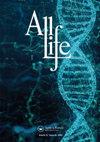K. Hassanpour, H. Esmaeili Gouvarchin Ghaleh, M. Khafaei, A. Hosseini, Gholamreaza Farnoosh, T. Badri, Mostafa Akbariqomi
{"title":"睡眠作为一种可能的免疫调节剂:治疗COVID-19的新方法","authors":"K. Hassanpour, H. Esmaeili Gouvarchin Ghaleh, M. Khafaei, A. Hosseini, Gholamreaza Farnoosh, T. Badri, Mostafa Akbariqomi","doi":"10.1080/26895293.2023.2166131","DOIUrl":null,"url":null,"abstract":"The potential advantages of sleep concerning suppressing cytokine storms and inflammation in coronavirus disease 2019 (COVID-19) based on its immunopathogenesis are summarized in the current study. COVID-19 as a global pandemic in the past months has afflicted many people. Clinical properties, pathology, and the pathogenesis of acute respiratory disorder caused by coronaviruses or other pathogens are evidence implying the probable contribution of oxidation, excessive inflammation, and excessive immune response, particularly cytokine storm, to the pathology of COVID-19. According to findings by experimental and clinical research on animals and in humans, sleep loss impairs immune function. Sleep loss strongly influences peripheral levels of the immune response's inflammatory mediators, which is accomplished by the generation of various hormones and mediators during sleep. There are a large number of studies supporting the presence of reciprocal regulation between low-intensity inflammatory response and sleep. By improving sleep quality and at the same time adjusting the circadian rhythm, it may be possible to prevent infections and boost immunity. As a result, sufficient (or even more) sleep duration may lower susceptibility to COVID-19 infection as well as increase antibody levels. © 2023 The Author(s). Published by Informa UK Limited, trading as Taylor & Francis Group.","PeriodicalId":48478,"journal":{"name":"All Life","volume":"21 1","pages":""},"PeriodicalIF":1.0000,"publicationDate":"2023-01-19","publicationTypes":"Journal Article","fieldsOfStudy":null,"isOpenAccess":false,"openAccessPdf":"","citationCount":"0","resultStr":"{\"title\":\"Sleep as a likely immunomodulation agent: novel approach in the treatment of COVID-19\",\"authors\":\"K. Hassanpour, H. Esmaeili Gouvarchin Ghaleh, M. Khafaei, A. Hosseini, Gholamreaza Farnoosh, T. Badri, Mostafa Akbariqomi\",\"doi\":\"10.1080/26895293.2023.2166131\",\"DOIUrl\":null,\"url\":null,\"abstract\":\"The potential advantages of sleep concerning suppressing cytokine storms and inflammation in coronavirus disease 2019 (COVID-19) based on its immunopathogenesis are summarized in the current study. COVID-19 as a global pandemic in the past months has afflicted many people. Clinical properties, pathology, and the pathogenesis of acute respiratory disorder caused by coronaviruses or other pathogens are evidence implying the probable contribution of oxidation, excessive inflammation, and excessive immune response, particularly cytokine storm, to the pathology of COVID-19. According to findings by experimental and clinical research on animals and in humans, sleep loss impairs immune function. Sleep loss strongly influences peripheral levels of the immune response's inflammatory mediators, which is accomplished by the generation of various hormones and mediators during sleep. There are a large number of studies supporting the presence of reciprocal regulation between low-intensity inflammatory response and sleep. By improving sleep quality and at the same time adjusting the circadian rhythm, it may be possible to prevent infections and boost immunity. As a result, sufficient (or even more) sleep duration may lower susceptibility to COVID-19 infection as well as increase antibody levels. © 2023 The Author(s). Published by Informa UK Limited, trading as Taylor & Francis Group.\",\"PeriodicalId\":48478,\"journal\":{\"name\":\"All Life\",\"volume\":\"21 1\",\"pages\":\"\"},\"PeriodicalIF\":1.0000,\"publicationDate\":\"2023-01-19\",\"publicationTypes\":\"Journal Article\",\"fieldsOfStudy\":null,\"isOpenAccess\":false,\"openAccessPdf\":\"\",\"citationCount\":\"0\",\"resultStr\":null,\"platform\":\"Semanticscholar\",\"paperid\":null,\"PeriodicalName\":\"All Life\",\"FirstCategoryId\":\"103\",\"ListUrlMain\":\"https://doi.org/10.1080/26895293.2023.2166131\",\"RegionNum\":4,\"RegionCategory\":\"综合性期刊\",\"ArticlePicture\":[],\"TitleCN\":null,\"AbstractTextCN\":null,\"PMCID\":null,\"EPubDate\":\"\",\"PubModel\":\"\",\"JCR\":\"Q3\",\"JCRName\":\"MULTIDISCIPLINARY SCIENCES\",\"Score\":null,\"Total\":0}","platform":"Semanticscholar","paperid":null,"PeriodicalName":"All Life","FirstCategoryId":"103","ListUrlMain":"https://doi.org/10.1080/26895293.2023.2166131","RegionNum":4,"RegionCategory":"综合性期刊","ArticlePicture":[],"TitleCN":null,"AbstractTextCN":null,"PMCID":null,"EPubDate":"","PubModel":"","JCR":"Q3","JCRName":"MULTIDISCIPLINARY SCIENCES","Score":null,"Total":0}
引用次数: 0
Sleep as a likely immunomodulation agent: novel approach in the treatment of COVID-19
The potential advantages of sleep concerning suppressing cytokine storms and inflammation in coronavirus disease 2019 (COVID-19) based on its immunopathogenesis are summarized in the current study. COVID-19 as a global pandemic in the past months has afflicted many people. Clinical properties, pathology, and the pathogenesis of acute respiratory disorder caused by coronaviruses or other pathogens are evidence implying the probable contribution of oxidation, excessive inflammation, and excessive immune response, particularly cytokine storm, to the pathology of COVID-19. According to findings by experimental and clinical research on animals and in humans, sleep loss impairs immune function. Sleep loss strongly influences peripheral levels of the immune response's inflammatory mediators, which is accomplished by the generation of various hormones and mediators during sleep. There are a large number of studies supporting the presence of reciprocal regulation between low-intensity inflammatory response and sleep. By improving sleep quality and at the same time adjusting the circadian rhythm, it may be possible to prevent infections and boost immunity. As a result, sufficient (or even more) sleep duration may lower susceptibility to COVID-19 infection as well as increase antibody levels. © 2023 The Author(s). Published by Informa UK Limited, trading as Taylor & Francis Group.

 求助内容:
求助内容: 应助结果提醒方式:
应助结果提醒方式:


